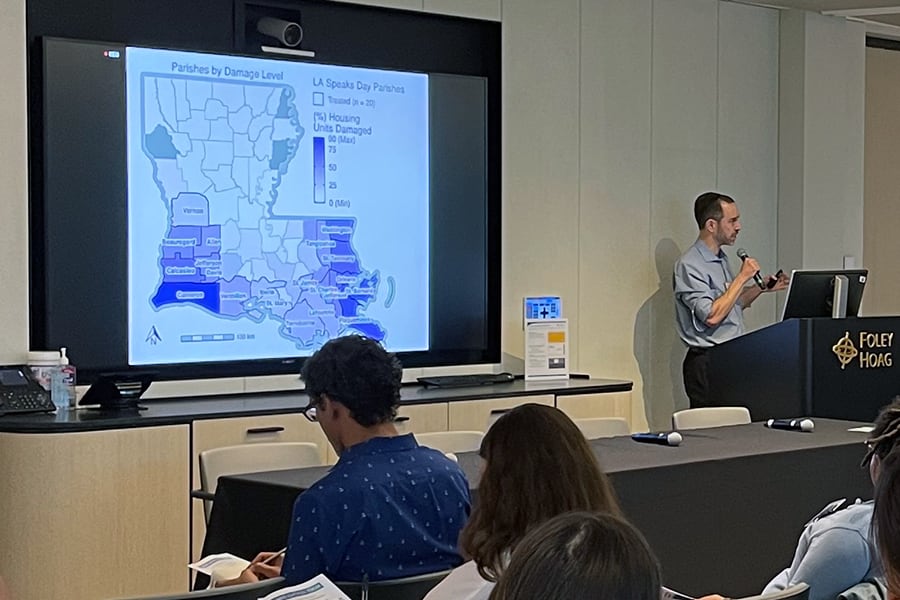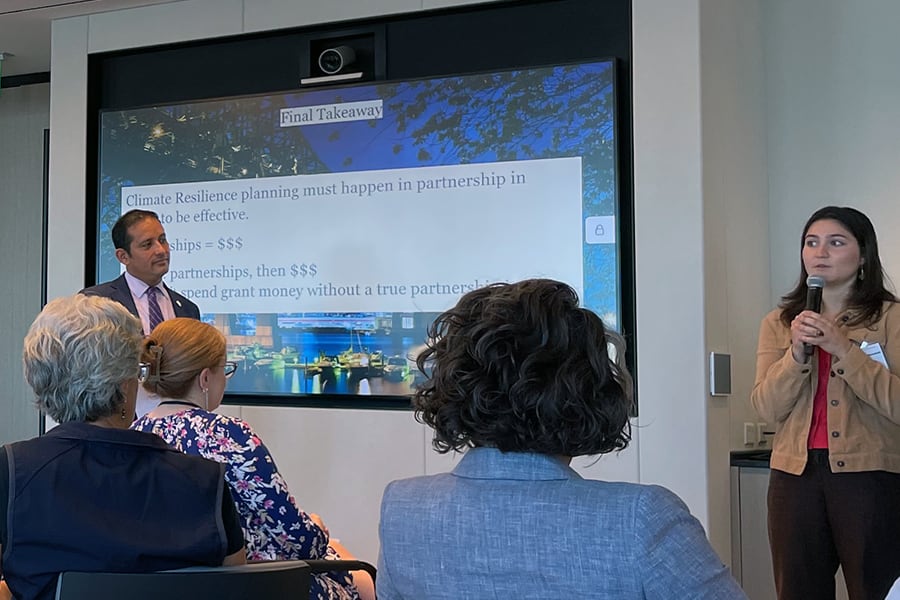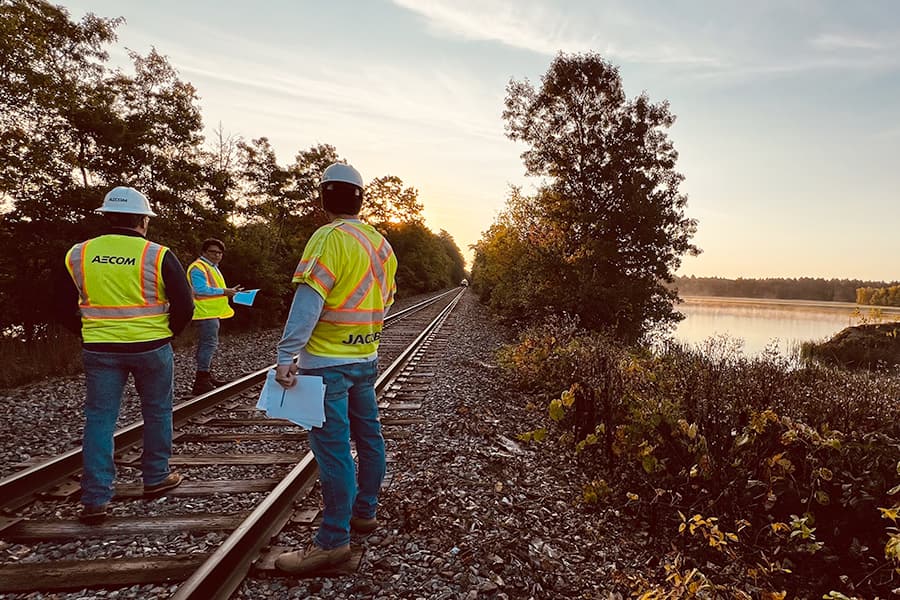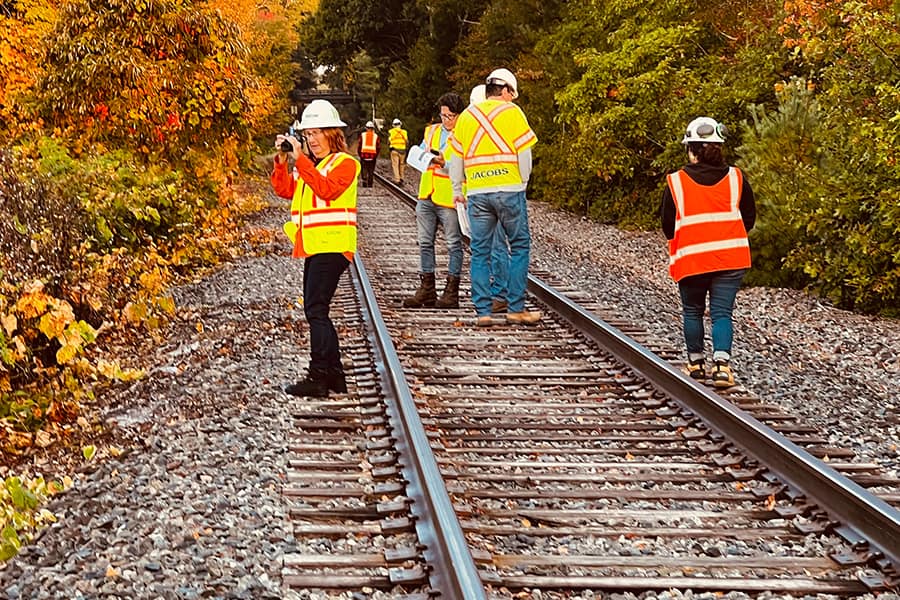- Home
- Sustainable Solutions Lab
- Projects & Initiatives
Northeast Climate Justice Research Collaborative
Launched in the Spring of 2022, the Northeast Climate Justice Research Collaborative (The Collaborative) is a trans-disciplinary network for academic and community researchers in the Northeast.
The Collaborative is composed of researchers—whether experienced or just getting started—who are interested in actively working to advance practices and policies that ensure historically excluded communities are safe and healthy despite the changing climate. Through networking, dialogue, funding, and resource-sharing, we support scholars to maximize the benefits of research for the communities they are working with. The Collaborative is convened by the Sustainable Solutions Lab (SSL) at the University of Massachusetts Boston.
Joining the Northeast Climate Justice Research Collaborative grants you access to:
- Seed grants to support climate justice research in the Northeast
- Workshops to support researchers' ability to leverage their work and make it actionable
- Collaborative gatherings, convenings, and networking opportunities
- SSL's climate justice literature Mendeley library
- The Collaborative listserv for sharing ideas, questions and resour
We welcome all local and regional climate justice researchers — whether you've been doing research in the field for many years or are starting to explore this area of inquiry.
Climate Adaptation Forum
The Climate Adaptation Forum is a quarterly series of half-day events organized by the Environmental Business Council of New England and the Sustainable Solutions Lab (SSL) at UMass Boston, serves as a vital platform for addressing the pressing challenges of climate adaptation and resilience. Since its establishment in 2017, the Forum has brought together experts and thought leaders from local, national, and global organizations to present cutting-edge insights on critical topics such as infrastructure resilience, environmental justice, and innovative adaptation strategies.
The Climate Adaptation Forum brings together diverse speakers and attendees across multiple sectors to engage in half-day presentations, networking, and discussions.
Climate Careers Curricula Initiative (C3I)
The Climate Careers Curricula Initiative (C3 Initiative), supported by the Liberty Mutual Foundation (LMF), aims to create and offer microcredentialed training programs for blue and green jobs in Greater Boston. This comprehensive, community-centered approach focuses on providing career pathways for underrepresented populations, especially vulnerable young adults, people of color, and low-income adults from environmental justice communities.
Key elements of the program will include:
- Curriculum Development: Collaborating with industry partners, community-based organizations, and academic experts to develop microcredentialed training programs for high-demand blue and green jobs.
- Community Engagement: Recruiting participants from environmental justice communities by working closely with local organizations and city programs.
- Partnerships for Career Pathways: Establishing partnerships with employers to create pathways from training to employment, including internships, job placement assistance, and mentoring.
- Continuous Evaluation: Regularly assessing program outcomes to ensure alignment with community needs and industry demands.
- Greater Impact We will work with local and state policymakers to share our findings on addressing systemic barriers to entry in blue and green jobs.
The initiative plans to develop six microcredentialed programs over three years, covering areas such as solar installation, energy auditing, and nature-based solutions. The program aims to enroll 90 participants over 3 years, with 75% of participants coming from underrepresented groups.
Cape Cod Rail Resilience Project
The Sustainable Solutions Lab (SSL) is proud to be part of the Cape Cod Rail Resilience Project, led by Carlos Velásquez, a PhD candidate at UMass Boston and project manager at MassDOT.
This initiative aims to improve rail safety and climate resilience along the Cape Main Line by integrating advanced technology with stakeholder-driven research methods. The project, inspired by Velásquez’s doctoral research, addresses the increasing risks posed by climate change to critical transportation infrastructure. It was launched in response to a significant 300-foot rail embankment collapse in East Sandwich in 2020, an event linked to climate change-induced drought conditions. With USDOT funding, the team is using drones for mapping and sensors for monitoring water levels. This collaborative effort brings together MassDOT, UMass Boston, and AECOM experts. The innovative approach combines aerial surveys, hydrological drought analysis, and real-time monitoring systems at three pilot study sites.
The Cape Cod Rail Resilience Project team conducts a field visit to select pilot study sites.
Climate Inequality and Integrative Resilience (CLIIR) Initiative
With climate resilience and inequality as an umbrella, the CLIIR Initiative focuses on three main themes: Indigenous Knowledge and Governance, Climate Migration, and Climate Change and Health. Our work was funded by a National Science Foundation planning grant through the Centers for Research Innovation in Science, Environment, and Society (CRISES) program.
We work with these three themes because they:
- leverage areas of strength within our team and partner networks.
- have significant interconnections, fostering our capacity to think and work holistically.
- provide testing grounds for building the Decision Support Hub and advancing the study of individual and collective decision-making.



